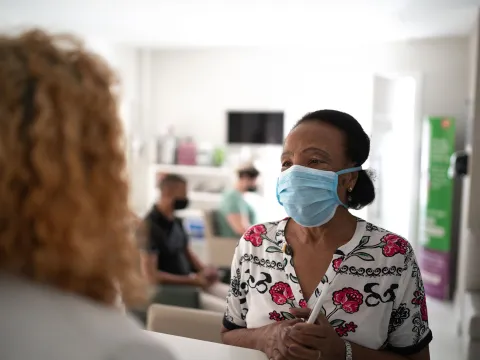- Markus Agito, MD
Choose the health content that’s right for you, and get it delivered right in your inbox.
It is estimated that each year, about one in 25 adults in the United States experiences dysphagia, or difficulty swallowing. It occurs more often in older adults and is frequently caused by or related to other health conditions such as gastroesophageal reflux disease (GERD), infections, radiation, benign and malignant tumors, and neuromuscular disease.
AdventHealth Center for Esophageal and Swallowing Disorders is the only sub-specialized facility of its kind in Central Florida. It provides patients with streamlined access to a multidisciplinary team who work together with the patient to provide personalized and compassionate care.
About Dysphagia
While swallowing seems simple, it is actually a complex process involving significant coordination between a number of muscles and nerves, as well as the brain. Persistent dysphagia should never be taken for granted as it is often a red flag indicating a more serious problem within the body. Recurring symptoms that can indicate the need to see a physician for medical evaluation include the following:
- Inability to swallow
- Pain while swallowing
- Coughing or gagging
- Sensation that food is stuck
- Unexpected weight loss
- Regurgitation or vomiting
- Frequent heartburn
Diagnosing Dysphagia
The team at AdventHealth Center for Esophageal and Swallowing Disorders offers advanced diagnostic tools and technology, individualizing the approach based on each patient’s unique health history and specific symptoms. Diagnostic tests can include:
- Videofluoroscopic swallow study (VFSS) with Esophogram — also known as modified barium swallow, is a radiologic test that helps identify dysfunction in the swallowing mechanisms, as well as structural abnormalities in the throat and esophagus
- Endoscopy/esophagogastroduodenoscopy, (EGD) — a nonsurgical procedure that involves inserting a long, flexible tube with a camera on the end to visually examine the esophagus and upper intestinal tract. A biopsy can be performed at the same time if needed.
- High Resolution Esophageal Manometry — a test used to measure the pressure contractions and movement coordination of the esophagus while swallowing
- Esophageal pH testing (conventional and BRAVO testing) — measures and records the amount of gastric reflux and acidity as it enters the esophagus
- Functional lumen imaging probe (FLIP) topography — measures distensibility of the esophagus to help assist in diagnosing and treating esophageal conditions
- Imaging scans — can include CT or MRI scans to provide detailed images of the neck, chest and abdomen
Multi-disciplinary Care Team
AdventHealth believes in taking a multidisciplinary approach to provide a personalized treatment plan for each patient. The care team can include any of the following:
- Otorhinolaryngology
- Gastroenterology
- Neurology
- Medical and Surgical Oncology
- Specialized Surgery (interventional endoscopy, head and neck, foregut, thoracic)
- Speech Pathology
- Nutrition
- Mental Health
- Care Coordinator, Social Worker, Life Coach
Treatment Options
The goal of the AdventHealth Center for Esophageal and Swallowing Disorders is to make it easy for each patient to come in for a thorough evaluation and walk out well informed and with a customized solution to their problem. We specialize in a wide range of medical, endoscopic and minimally invasive surgical therapy options for dysphagia, including the following:
- Esophagogastroduodenoscopy (EGD) with BOTOX® — an endoscopic procedure where BOTOX® is injected into the lower esophageal sphincter to help it relax
- EsoFLIP™ dilation — uses a specialized balloon dilator to provide accurate and controlled dilation of the esophagus
- Dilation of complex strictures — an endoscopic procedure to open up irregular or asymmetric narrowing within the esophagus
- Esophageal stenting — a procedure where a cylindrical mesh is used to reopen a narrowed or blocked segment of the esophagus allowing food and liquid to pass
- Peroral endoscopic myotomy (POEM) — an endoscopic procedure for patients with achalasia which helps relieve tightness in the lower esophageal sphincter
- Heller myotomy — a minimally invasive surgical procedure for patients with achalasia which helps relieve tightness in the lower esophageal sphincter
- Endoscopic mucosal resection (EMR) — an outpatient procedure to remove pre-cancerous, early-stage cancerous or other abnormal lesions located in the digestive tract
- Endoscopic submucosal dissection (ESD) — an advanced endoscopic surgical procedure to remove tumors in the gastrointestinal tract
- Management of esophageal perforation and leaks — can include endoscopy, surgery, or a combination of both that is customized for a patient’s specific needs
Board certified in gastroenterology and internal medicine, Markus Agito, MD, specializes in gastrointestinal motility and functional disorders. Prior to joining AdventHealth, he was on faculty at the University of Florida, College of Medicine and served as the Associate Program Director for the Gastroenterology fellowship program and Division Education Director. Dr. Agito is widely published in the field of Gastroenterology and is an active member of the American Gastroenterology Association, American College of Gastroenterology, and the American Neurogastroenterology and Motility Society.
To schedule an appointment or refer a patient to the AdventHealth Center for Esophageal and Swallowing Disorders.





